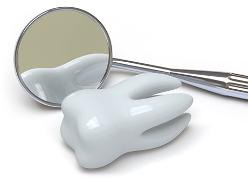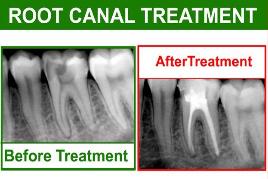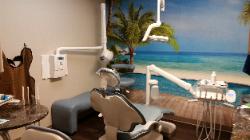
Before Treatment
To assist you in preparing for your appointment, please consider the following recommendations:
• Eat regular meals before your appointment, unless otherwise indicated.
• Please ensure that you have your current dental insurance information before your appointment.
• Pre-medicate with antibiotics, if you are required to by your physician, before dental appointments.
• Unless instructed by your Endodontics, do NOT take any pain medications prior to your appointment.
• If you are given X-rays or have referral information from your general dentist, please bring these to your appointment.
1. Continue all medications for blood pressure, diabetes, thyroid problems and any other conditions as recommended by your physician. If there is a
question, please call our office prior to your appointment.
2. Please eat a full breakfast or lunch as applicable.
3. If you have been advised by your physician or dentist to use antibiotic premedication because of mitral valve prolapse(MVP), heart murmur, hip, knee,
cardiac or other prosthesis, or if you have rheumatic heart disease, please make sure you are on the appropriate antibiotic on the day of your
appointment. If there is a question, please call our office prior to your appointment.
4. Unless instructed by your Endodontics, do NOT take any pain medications prior to your appointment.
This procedure will be performed using local anesthesia. There are usually no restrictions after the procedure concerning driving or returning to work. A
doctor is available for consultation at all times should a problem arise after your treatment.
NOTE: If you are scheduled for a diagnostic appointment only, please avoid taking any pain medication at least 4 hours prior to your visit. This will better
allow the doctors to pinpoint the origin of your pain and provide an accurate diagnosis and treatment plan.
To assist you in preparing for your appointment, please consider the following recommendations:
• Eat regular meals before your appointment, unless otherwise indicated.
• Please ensure that you have your current dental insurance information before your appointment.
• Pre-medicate with antibiotics, if you are required to by your physician, before dental appointments.
• Unless instructed by your Endodontics, do NOT take any pain medications prior to your appointment.
• If you are given X-rays or have referral information from your general dentist, please bring these to your appointment.
1. Continue all medications for blood pressure, diabetes, thyroid problems and any other conditions as recommended by your physician. If there is a
question, please call our office prior to your appointment.
2. Please eat a full breakfast or lunch as applicable.
3. If you have been advised by your physician or dentist to use antibiotic premedication because of mitral valve prolapse(MVP), heart murmur, hip, knee,
cardiac or other prosthesis, or if you have rheumatic heart disease, please make sure you are on the appropriate antibiotic on the day of your
appointment. If there is a question, please call our office prior to your appointment.
4. Unless instructed by your Endodontics, do NOT take any pain medications prior to your appointment.
This procedure will be performed using local anesthesia. There are usually no restrictions after the procedure concerning driving or returning to work. A
doctor is available for consultation at all times should a problem arise after your treatment.
NOTE: If you are scheduled for a diagnostic appointment only, please avoid taking any pain medication at least 4 hours prior to your visit. This will better
allow the doctors to pinpoint the origin of your pain and provide an accurate diagnosis and treatment plan.
General Instructions
Your tooth and surrounding gum tissue may be slightly tender for several days as a result of manipulation
during treatment and previous condition of your tooth. This tenderness is normal and is no cause for alarm. Do
not chew food on the affected side until your Endodontics therapy is completed and your tooth is covered with a
protective restoration provided by your restorative dentist. You may continue your regular dental hygiene
regimen. Discomfort may be alleviated by taking over the counter medications such as ibuprofen (Advil), aspirin,
or acetaminophen (Tylenol). Your doctor may prescribe a prescription pain medication.
NOTE: Should you experience discomfort that cannot be controlled with the above listed medications, or should
swelling develop, please contact this office immediately.
Your tooth and surrounding gum tissue may be slightly tender for several days as a result of manipulation
during treatment and previous condition of your tooth. This tenderness is normal and is no cause for alarm. Do
not chew food on the affected side until your Endodontics therapy is completed and your tooth is covered with a
protective restoration provided by your restorative dentist. You may continue your regular dental hygiene
regimen. Discomfort may be alleviated by taking over the counter medications such as ibuprofen (Advil), aspirin,
or acetaminophen (Tylenol). Your doctor may prescribe a prescription pain medication.
NOTE: Should you experience discomfort that cannot be controlled with the above listed medications, or should
swelling develop, please contact this office immediately.
Post Treatment
It is normal to feel some tenderness in the area over the next few days as your body undergoes the natural healing process. You may also feel some
tenderness in your jaw from keeping it open for an extended period of time and the injection site. These symptoms are temporary and usually respond
very well to over-the-counter pain medications. It is important for you to follow the instructions on how to take these medications. Remember that
narcotic medications, if prescribed, may make you drowsy, and caution should be exercised in operating dangerous machinery or driving a car after
taking them.
Your tooth may continue to feel slightly different from your other teeth for some time after your root canal treatment has been completed. However, if
you have severe pain or pressure that lasts more than a few days, contact your Endodontics.
Guidelines for Post-Treatment Care
•Do not eat anything until the numbness in your mouth wears off.
•Do not chew or bite on the treated tooth until you have had it restored by your dentist.
•Be sure to brush and floss your teeth as you normally would.
•If the opening in your tooth was restored with a temporary filling material, it is not unusual for a thin layer to wear off in-between appointments.
However, if you think the entire filling has come out, contact your Endodontics.
•Contact your Endodontics right away if you develop any of the following:
-Visible swelling inside or outside of your mouth;
-Allergic reaction to medication, including rash, hives or itching (nausea is not an allergic reaction);
-Return of original symptoms.
- Bite feels uneven.
It is normal to feel some tenderness in the area over the next few days as your body undergoes the natural healing process. You may also feel some
tenderness in your jaw from keeping it open for an extended period of time and the injection site. These symptoms are temporary and usually respond
very well to over-the-counter pain medications. It is important for you to follow the instructions on how to take these medications. Remember that
narcotic medications, if prescribed, may make you drowsy, and caution should be exercised in operating dangerous machinery or driving a car after
taking them.
Your tooth may continue to feel slightly different from your other teeth for some time after your root canal treatment has been completed. However, if
you have severe pain or pressure that lasts more than a few days, contact your Endodontics.
Guidelines for Post-Treatment Care
•Do not eat anything until the numbness in your mouth wears off.
•Do not chew or bite on the treated tooth until you have had it restored by your dentist.
•Be sure to brush and floss your teeth as you normally would.
•If the opening in your tooth was restored with a temporary filling material, it is not unusual for a thin layer to wear off in-between appointments.
However, if you think the entire filling has come out, contact your Endodontics.
•Contact your Endodontics right away if you develop any of the following:
-Visible swelling inside or outside of your mouth;
-Allergic reaction to medication, including rash, hives or itching (nausea is not an allergic reaction);
-Return of original symptoms.
- Bite feels uneven.
Discomfort
Discomfort after routine endodontic treatment is usually minimal and may be alleviated by taking ibuprofen
(Advil or Motrin), aspirin, or acetaminophen (Tylenol) as directed. Occasionally, prescription pain medicine
and/or antibiotics may be necessary and you should receive prescriptions for these during your visit to our
office. Alcohol intake is not advised while taking any of these medications. If you experience post-treatment
symptoms that are not alleviated by your medications, please contact this office immediately.
Discomfort after routine endodontic treatment is usually minimal and may be alleviated by taking ibuprofen
(Advil or Motrin), aspirin, or acetaminophen (Tylenol) as directed. Occasionally, prescription pain medicine
and/or antibiotics may be necessary and you should receive prescriptions for these during your visit to our
office. Alcohol intake is not advised while taking any of these medications. If you experience post-treatment
symptoms that are not alleviated by your medications, please contact this office immediately.



| GRANITE STATE ENDODONTICS Dr. Aneesa Al-Khalidi D.M.D 505 West Hollis Street ~ Suite 104 Nashua, NH 03062 603-883-3636 |


